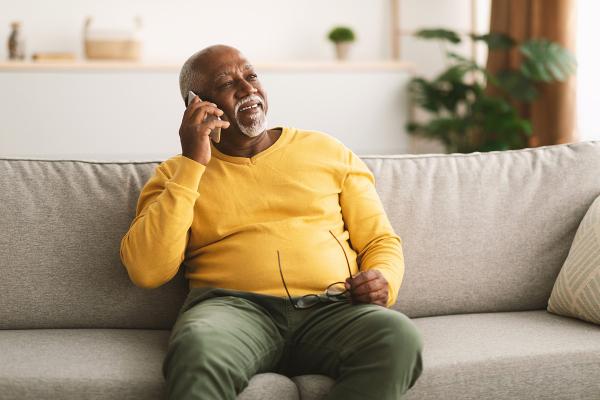
It may be time to get your hearing checked. AARP Hearing Solutions makes it simple. Find a provider today.
Getting together with loved ones over the holidays? Here’s how to make it easier to catch up with friends and relatives.

There is a lot to love about the holidays. There are gifts and cookies. There are games and good cheer. And, of course, the holiday gatherings featuring food, whether it’s a sit-down family meal or potluck dinner.
But people with hearing loss may have a tough time at social events. “Hearing while in a noisy environment can be tricky,” says Brianne Salzmann, Au.D. She’s a clinical audiologist at Providence Swedish Otolaryngology in Seattle.
For one thing, there may be multiple conversations going on at once. There may be music playing. The room may have high ceilings and bare walls, which cause sound to bounce off the surfaces and add to the background noise.1,2
All that can be exhausting and overwhelming if you have hearing loss, even if you wear hearing aids. In fact, some people who have trouble hearing might choose to skip social events altogether. Or sit in a corner and not really take part in the festivities. Their world shrinks, and they may become lonelier and more isolated.1
It doesn’t have to be like that though. Read on for tips that can make friends-and-family gatherings more fun again.

It may be time to get your hearing checked. AARP Hearing Solutions makes it simple. Find a provider today.
If you’re not hosting the gathering, ask the person who is for help. They can control the environment so you’re able to hear more clearly. Here are some ways a host can help you out:1,3
The best type of seating for people who are hard of hearing? Round tables. That way, you can face everybody at the table — and keep background noise behind you.2
If that’s not possible, sit toward the middle of the table. That will maximize the number of family members around and in front of you.4
Hang out with smaller groups whenever possible, advises Salzmann. That will keep background noise to a minimum and help you hear conversations better, especially if they are one-on-one (or two-on-one). Bonus if the room is also carpeted and has cushioned seating. Both can absorb sound and keep noise from becoming too loud.1,2
If the gathering is only in one room, move to a quieter part of it, says Salzmann.
“Self-advocate,” advises Salzmann. It’s better to make everyone aware of your hearing loss so family members can work together to make things easier.
Then be specific. You can say things like:
It’s also perfectly fine to ask someone to speak more slowly and clearly. “Adding pauses between sentences gives a listener with hearing loss time to ‘fill-in’ any information they might have missed,” adds Salzmann.
Hearing aids may help you hear better in all sorts of settings. But there are ways to help your hearing aids work even better.1 A good place to start? Ask your hearing care professional about the newest technology. If you belong to AARP®, you can request a no-cost hearing exam and consultation through AARP® Hearing Solutions™ provided by UnitedHealthcare Hearing.
Focusing on and listening to people, especially in noisier situations, can tire you out. So, come to the event well-rested. And take some time-outs during the gathering. Maybe you can escape to a quieter room or go outside for a few minutes. This will give your ears a break.3,4
If you can’t hear well or it’s been a few years since you got your hearing aids checked, see a hearing care professional. They can give you a comprehensive hearing exam and consultation. Or advise you on a newer pair of hearing aids.
Whatever you do, don’t give up your social life. Being with family and friends may help you feel more connected. And that will help you enjoy the holidays — and any season — the way you deserve.
Ready to request a hearing exam and consultation? AARP Hearing Solutions has a national network of hearing care professionals. Request an appointment.
Sources
Information is for educational purposes only and is not a substitute for the advice of a licensed medical provider. Consult your provider prior to making changes to your lifestyle or health care routine.
AARP Hearing Solutions is available to all AARP members and does not require a health insurance plan from UnitedHealthcare. The AARP hearing program discount cannot be combined with any other discounts, promotions, coupons or hearing aid benefit plans unless noted herein. Products or services that are reimbursable by federal programs including Medicare and Medicaid are not available on a discounted or complimentary basis. AARP commercial member benefits are provided by third parties, not by AARP or its affiliates. Providers pay a royalty fee to AARP for the use of its intellectual property. These fees are used for the general purposes of AARP. Some provider offers are subject to change and may have restrictions. Please contact the provider directly for details. UnitedHealthcare Hearing is provided through UnitedHealthcare, offered to existing members of certain products underwritten or provided by UnitedHealthcare Insurance Company or its affiliates to provide specific hearing aid discounts. This is not an insurance nor managed care product, and fees or charges for services in excess of those defined in program materials are the member's responsibility. UnitedHealthcare does not endorse nor guarantee hearing aid products/services available through the hearing program. This program may not be available in all states or for all group sizes. Components subject to change.
Network size varies by market.